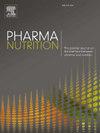The gut brain axis, effect of dietary changes and probiotics supplement on depression symptoms
IF 2.4
Q3 NUTRITION & DIETETICS
引用次数: 0
Abstract
Introduction
Depression is a prevalent mental condition that adversely affects the lives of millions globally. Research has examined the correlation between alterations in gut microbiota composition and depression, leading to increasing interest in the possible use of probiotics to restore gut microbiota balance and enhance mental health outcomes.
Aim
Our aim is to examine the impact of probiotic supplementation on depression in healthy people. By assessing the impact of non-pharmacological therapies aimed at the gut-brain axis, we aspire to contribute to the advancement of accessible and efficacious treatments for depression.
Methods
We assessed socioeconomic status and depression score at baseline in a randomized controlled experiment of healthy people. We then randomly allocated individuals to the intervention group, which got probiotic supplements and health information regarding probiotic-rich diets, or the control group, which received their regular diet. At the end of 12 weeks, we repeated the same measurements.
Results
The study indicated a notable enhancement in depression levels within the intervention group. The median depression score declined from 8 (IQR: 6–9) prior to the intervention to 3 (IQR: 3–5) following the intervention, indicating a 62.5 % enhancement. The control group had a marginal deterioration in depression ratings within the same timeframe, with the median score rising from 8 (IQR: 6–9) to 8.5 (IQR: 7–10), indicating a 6.25 % drop.
Conclusions
Probiotics exert a beneficial influence on both the occurrence and intensity of depression symptoms in healthy people, greatly alleviating these symptoms.
肠脑轴,饮食变化和益生菌补充对抑郁症状的影响
抑郁症是一种普遍存在的精神疾病,对全球数百万人的生活产生了不利影响。研究已经检查了肠道微生物群组成变化与抑郁症之间的相关性,导致人们对使用益生菌恢复肠道微生物群平衡和改善心理健康结果的可能性越来越感兴趣。我们的目的是研究益生菌补充剂对健康人群抑郁症的影响。通过评估针对肠脑轴的非药物治疗的影响,我们渴望为抑郁症的可及和有效治疗的进步做出贡献。方法对健康人群进行社会经济地位和抑郁评分的随机对照实验。然后,我们随机将个体分配到干预组,干预组获得益生菌补充剂和有关富含益生菌的饮食的健康信息,对照组则接受常规饮食。在12周结束时,我们重复相同的测量。结果干预组患者抑郁水平明显提高。中位抑郁评分从干预前的8分(IQR: 6-9)下降到干预后的3分(IQR: 3 - 5),表明提高了62.5 %。在同一时间段内,对照组的抑郁评分略有下降,中位数从8分(IQR: 6-9)上升到8.5分(IQR: 7-10),下降了6.25 %。结论益生菌对健康人群抑郁症状的发生和强度均有有益影响,可显著缓解抑郁症状。
本文章由计算机程序翻译,如有差异,请以英文原文为准。
求助全文
约1分钟内获得全文
求助全文
来源期刊

PharmaNutrition
Agricultural and Biological Sciences-Food Science
CiteScore
5.70
自引率
3.10%
发文量
33
审稿时长
12 days
 求助内容:
求助内容: 应助结果提醒方式:
应助结果提醒方式:


